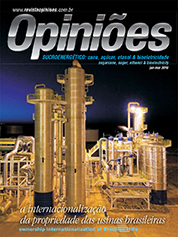Igor Montenegro Celestino Otto
Executive Director of the USJ Group
Op-AA-23
Adapt or die
“Pressures affecting organizations are well publicized: global competition; increasingly demanding clients; lack of resources (human, financial, material and natural); huge leaps in technology. The common theme that unites these pressures is change – merciless, multilayered, unrelenting and blindingly fast.” This is an observation of Geary Rummler and Alan Brach, in their acclaimed book Companies’ Best Performances (Brazilian Edition’s title).
Additionally to these pressures there are new needs of society, relative to sustainability and continuously lower prices, that require constant growth of scale and improvement of production processes. Therefore, we will see that it will not be simplistic solutions and superficial answers that will make it possible to overcome the challenges ahead and, in particular, this one, which is the internationalization of companies of the Brazilian sugar-based energy industry.
Capitalism in Brazil has matured. Economic stability has been achieved, combining low inflation, growth of income and GDP, the strengthening of the domestic market, the decline in interest rates and the increase of foreign exchange reserves. Currently, foreign exchange is still a barrier to competitiveness, since it hinders the growth of exports, but it is also an externality of a stronger currency.
The capital market hereabouts has stabilized and Brazilian securities are a part of investors’ portfolios around the world, emerged to the status of developed economy. Now, the obvious sequence of a developed and globalized economy is the internationalization of companies in the main segments of productive activity.
This internationalization must be understood in a broad sense, both in the context of the expansion of the frontier of genuinely Brazilian-controlled companies, and as it relates to the entry of new foreign competitors, whether individually or through partnerships with Brazilian companies. We have seen this happen in important consumer markets, telecommunications, food, beverages, home appliances, mining, steel, among others.
In most cases, foreign companies performed in a consolidation role in the Brazilian market, but the contrary also occurs, when Brazilian companies consolidate the foreign market. There were still two large untouched Brazilian industry sectors: the sugar-based energy industry and civil construction. Not any longer.
Recently one has particularly noticed a growing movement of foreign companies investing in the sugar-based energy industry in Brazil, such as French companies Tereos and LDC, Spanish company Abengoa, British company BP, and, lastly, Anglo-Dutch company Shell. What one is not seeing is the contrary, i.e., the expansion of Brazilian companies in the international market, as were the successful cases of Vale, Gerdau, Ambev and JBS Friboi.
Companies in the sugar-based energy industry are proud of the fact that they have the lowest production costs in the world and the best available technology. However, by-gone victories will not warrant success in the future. New raw materials, new products and new technologies are currently being developed, with billions of dollars in investments, in USA, Europe and Asia.
Nothing of sorts is taking place in Brazil. Investments in innovation, hereabouts, are still quite timid and concentrated in few research centers, private and public. Our technological edge is about to be lost. Companies’ shareholder and capital structures, the management models and the level of professionalization in the traditional sugar-based energy industry are also much out-dated in relation to most new competitors that have al-ready arrived or are about to do so.
However, this does not mean that we will see rapid concentration in the sugar and ethanol industry. The sugar-based energy industry is highly fragmented in Brazil and spreads across very different geographic regions. Industry businesses are mostly family-run, providing many families of different regions their livelihood. Deeply rooted century-old cultures make these families cling to their businesses.
Deep-rooted knowledge of the activity also differentiates the traditional entrepreneur, who is still capable of extracting his competitiveness from this model. Therefore, new international companies will still have to coexist for some decades with family-run businesses. Many of these family businesses are rapidly professionalizing, to be prepared to compete in a more dynamic market.
The profile of the Brazilian company that will be firmly set to compete with the international companies will be that of a company that invests in innovation and new technologies, professionalizes its management, implements corporate governance, organizes its capital structure, improves the quality of services, provides excellent services to clients, develops differentiated products, improves and motivates its staff, raises the company’s productivity by reducing costs, is capable of expanding the client base and increases international penetration, also by investing in other regions around the world.
The requirements are numerous and will represent radical transformation for these organizations. The change is not merely a new option, but perhaps the only way out for who seeks to survive. Nature’s evolutionary process, defended by Charles Darwin, encompasses all living beings, as well as their organizations, because these too are alive and subject to evolution.
To get to here, as individuals and as a society, successive and successful evolutionary changes were necessary. This evolution may be summarized in the generation after generation adaptation to the environment in which they lived. As in life and in business, there is but one chance to win: to better and more quickly adapt to the environment, in comparison with competitors.
There is a popular saying: “Adapt or die”. Nothing is more true. Only by redesigning the business and management model of a company will it be possible to bring about the needed changes to the new and changing organizational environment, providing more strength and agility to beat the competition. Action and inertia are equivalent forces.
Life conditions imposed by contemporary society tend to take an individual more towards inertia than to action, in terms of change. The comfort zone, which includes and accommodates people in their little comfort universes, is the same that prevents development. However, there is no longer a safe place, not even in the comfort zones. Naturally, change is not painless or pacific, but the change process is a constant variable, both in life and in Nature in general. Action must beat inertia. The objective of Brazilian sugar-based energy companies will thus be to promote structural changes needed to adapt and to survive in the new business environment, setting these companies on course to high performance.
The objective will always be to achieve the entrepreneurial level of sophistication of the leaders, while maintaining agility and flexibility they lack and accomplishing this not for the sake of competing for leadership, but rather for eternalizing the business. Once this objective is achieved, new and challenging responsibilities will create other even greater objectives. The challenge lies ahead of us, and the role of companies and their staff – actually an irrefusable role – is to decide exactly in what place of the future they want to live.





